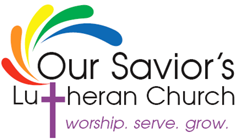November 24, 2019 (Christ the King Sunday)
November 24, 2019
Christ the King 2019
Our Savior’s La Crosse
Luke 23:33-43
This morning we go to “a place called the Skull” (“Calling Forth the Kingdom” by Paul D. Duke in Christian Century November 8, 1995 p. 1043).
This morning we go to a place, to a time when evil and love converge, they intersect where two beams intersect on the cross of Jesus Christ (ibid Duke).
Today is Christ the King Sunday. The theme for Christ the King Sunday is the same, year after year. Every year we examine even as we celebrate the sovereignty of Jesus. The place called the Skull was ground zero. The Skull is where Jesus Christ’s reign found its shape and then changed the world forever.
Usually when we talk about kings we are talking about men who had or who have political power. Jesus, our king, was powerless. He hung on a cross, his hands and feet impaled (ibid Duke).
Usually kings had or have a domain, a land they rule over. Jesus, suspended on the cross in mid-air, couldn’t touch the ground beneath him (ibid Duke).
Usually kings or queens had or have subjects—people they rule over. In this story the man declared “king of the Jews” was being tortured and mocked by almost all of the people who surrounded him (ibid Duke).
Usually, kings had or have the opportunity to speak to their subjects with a voice of authority. For most of our story this morning, Jesus hung silent, mute, saying nothing to anyone (ibid Duke).
In democratic societies, leaders are elected by the people. In this story, there had been an election but in that informal vote the people were deciding whether or not to free Jesus from his captivity. And he lost the vote (ibid Duke).
In our story this morning it is clear, the word “king” hanging over the head of Jesus and being said by those near him—the word was a joke. It was a punchline for some kind of sick political cartoon (ibid Duke). Here’s Jesus! “King of the Jews” (Luke 23:38).
Literally, the emperor had no clothing.
Those gathered representing the empire; those gathered representing religious authorities—they all thought Jesus was a fraud.
Their ridicule was evil. All things considered, in that moment it appeared evil had won its own victory over good.
Then there was a voice. The voice of a criminal. Did everyone hear him speak or was it only Jesus? What we know is that Jesus heard the criminal’s words:
“Jesus, remember me when you come into your kingdom” (Luke 23:42).
We know Jesus heard the words. Luke tells us Jesus heard the criminal’s words and finally, finally Jesus spoke:
“Truly I tell you, today you will be with me in paradise” (Luke 23:43).
Christ the King lavishly granted forgiveness and peace on a criminal in his promise: Today you will be with me in paradise.
Let’s be clear. Evil did not go away in that moment. But goodness stole the crown. Goodness turned their mockery into an eternal promise. Today you will be with me in paradise.
Last Sunday we sang the words:
Goodness is stronger than evil; love is stronger than hate…
And we sang that the
Victory is ours, victory is ours, through God who loves us. (ELW Hymn #721).
The victory is ours, because God so loved the world that God gave us Jesus (John 3:16).
What does this mean?
Let’s look at the origins of Christ the King Sunday for our answer.
In the 1920’s Pope Pious XI declared the last Sunday in October as the feast day of Christ the King. (“The feast of Christ the King” on www.aquinasandmore.com). Oddly, that was also the day Protestants celebrated the Reformation. During the Second Vatican Council the festival of Christ the King was moved to the last day of the Church year to avoid the irony of the two feast days being celebrated at the same time. (“The Not so Ancient Origins of Christ the King” on www.lutheranforum.com).
The intentions of the day of Christ the King were more than a little political. Church leaders wanted to focus the attention of Christians on the sovereignty of Jesus Christ rather than on the rule of political leaders and dictators.
Our needs are no different today.
With Jesus Christ as our Sovereign leader, goodness can and will conquer the evils of the world. Love is stronger than hate.
Our call is to focus our lives on that radical call to love. Even in the midst of our sufferings. Even as we witness and experience the sufferings of and in the world.
Jesus has always been quite clear. Love is stronger than hate.
So, on this Christ the King Sunday we remember and we proclaim:
Victory is ours, victory is ours, through God who loves us. (Repeat together).
Amen.

